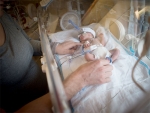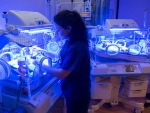Displaying items by tag: preterm infants
A screening program conducted by University of Alabama at Birmingham Callahan Eye Hospital ophthalmologists is helping cut negative outcomes from ROP in infants by half.
Tagged under
The Golden Week program developed by UAB’s Regional Neonatal Intensive Care Unit was recently recognized nationally for its standardized set of practices for premature infants, providing them with quality care in their first week of life.
Tagged under
A biomarker, endothelial mitochondrial function, may be useful for early identification of newborn babies at risk for lung disease and could enable novel therapy approaches.
Tagged under
Clinical and epidemiological data are combined with sociology and anthropology to better understand preterm birth in the United States compared to Canada, the United Kingdom and other Western European countries.
Tagged under
UAB researchers have discovered that an infant’s airway — once thought to be sterile until after birth — is colonized by bacteria or bacterial DNA, which could be protective for or predict development of severe lung disease, knowledge that may offer a therapeutic target.
Tagged under
Between-hospital variations in active treatment explain much of the difference seen in infants born at 22 to 24 weeks of gestation.
Tagged under
Tagged under
UAB Hospital’s NICU uses a new, non-invasive system that can identify preterm babies who are at-risk for deadly infection.







